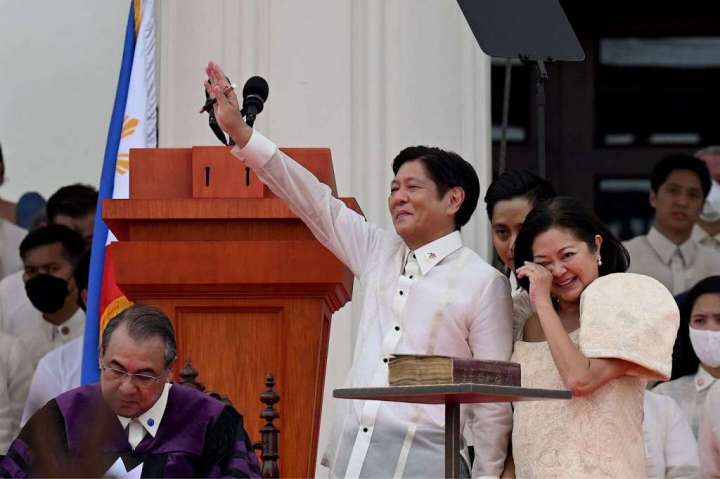MANILA — Philippine President Ferdinand Marcos Jr., son of the late dictator Ferdinand Emmanuel Marcos, was sworn in to office Thursday, sealing a family comeback that was decades in the making.
Marcos Jr. sworn in as Philippine leader in resurgence of ex-dictator’s family

Marcos Jr., known as “Bongbong,” takes office with the Philippine economy starting to recover from the pandemic. It is one of the fastest-growing nations in Southeast Asia, and many covid restrictions have been lifted. But inflation remains a threat, and poor infrastructure is an obstacle for growth. The president also has to balance relations between an assertive China, the regional giant, and the United States, a treaty ally.
Washington was represented at the ceremony, held at the capital’s National Museum, by a delegation led by second gentleman Doug Emhoff.
Hundreds of supporters spread out across the grass in the golf course in front of the museum. Sheryl Patalinhog Velez, 25, donned a red gown given to her by her mother, which she customized with green accents to match the Marcos campaign colors. She said it took her a month to make the dress, using recycled material like bottle caps arranged to look like “a sun for Sir BBM,” she said, using Marcos’s nickname. She also wore a makeshift ring, which she said symbolizes a “cute” Imelda, his mother.
She added that she got dolled up in the hopes of being noticed “so they can adopt me or give me work.”
Fears of clashes between supporters and detractors or heavy-handed police actions did not materialize and the protests both for and against Marcos on Thursday took place without violence.
Survivors of the elder Marcos’s autocratic regime — which include an estimated 70,000 who were detained and tens of thousands who were tortured — held a separate ceremony just outside the capital, in Quezon City, during which they pledged to “guard against tyranny.”
“The survivors are a vanishing breed, if not an endangered species, and the time to correct falsehoods and lay bare the truth is now,” said Tina Bawagan, a spokeswoman for the survivors. “Most of us remaining are in the last quarter of our lives. We are appalled at how the Marcoses have attempted to deny that dark and gruesome period of history.”
At another anti-Marcos demonstration, this time at Plaza Miranda, close to the inauguration site, 200 people gathered to protest. They were temporarily quieted by a flyby of three military jets from the nearby ceremony and then booed.
“There’s no difference between Marcos and Duterte,” the crowd chanted. “They’re both lap dogs, dictators, and fascists!”
In his inauguration speech, Marcos Jr. repeated the message of unity he gave on the campaign trail, that he was here to bring together all Filipinos, while referencing his father’s years in power.
“He got it done,” Marcos Jr. said. “So it will be with his son.” Shortly after, however, the president said he would not “talk about the past.”
The Marcos family is estimated to have plundered some $10 billion during two decades in power that were marred with rights abuses. But the new president benefited from an elaborate disinformation and rebranding campaign on social media.
The Philippine political system is dominated by family dynasties and a tradition of patronage. Marcos’s mother, Imelda, now 92, attended the inauguration. She was convicted of graft but was never imprisoned. His sister, Imee, is a senator, and his eldest son, Ferdinand Alexander, will serve as a lawmaker.
The new vice president is Sara Duterte-Carpio, the outgoing president’s daughter. She was sworn in to office this month but did not assume the vice presidency until Thursday.
On the campaign trail, Marcos skipped debates and interviews. He offered few specifics on policy, instead running on a vague promise of unity. Several of the top economic officials he has named served in the administration of the liberal former president Benigno Aquino III, whose family was a political rival of the Marcoses.
There is an “almost head-to-head balance between political and technocratic appointees” in the cabinet so far, said economist Ronald Mendoza, dean of the Ateneo School of Government.
The Marcos family can quiet detractors by actively engaging in reform, he added. “Otherwise, they would have squandered … a golden opportunity to try to resuscitate the [Marcos reputation],” he said. “I don’t think you’ll get that opportunity again for the entire clan.”
But critics fear that a Marcos presidency means a setback for institutional reform in a fledgling democracy with rampant corruption. Human rights advocates note that the president has pledged to carry on his predecessor’s drug war, though he has said he would do so legally. Duterte-Carpio’s position in high office also means it is unlikely that the new government will cooperate with the International Criminal Court’s investigation into her father’s deadly policy.






